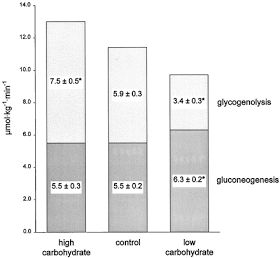Only 11 days but fat-adapted MIGHT be a different ball game (‘demand?/supply? driven’)? According to the chart gluconeogenesis (GNG) looks kinda high in the low carb arena?
“…Bisschop et al. in 2000 showed that subjects following a keto diet for 11 days had only a small (14%) increase in glucose production from GNG after overnight fasting, as shown in this graph. This works out to a difference of less than a gram of glucose per hour. …” …More
GNG could be lower if fat adapted but I am willing to bet my last dollar it’s going to be higher irregardless of being fat adapted or because of it; especially in the case of the diabetic and if you go over 3-to-4 oz. per day or per meal of protein intake; even if your not diabetic?
Also looks like less glycogen is being stored in the muscle tissue according to the chart? That could be why the GNG goes up?
The reason I am persuaded by this proposition is because of this study (above) and Dr. Berg in practice has a lot of people that he works with on a daily basis and they have concluded what works and what does not work i.e. 3-to-4 oz. or less of protein works; above that amount and we are talking GNG increase like that shown on the chart (above)?
In other words GNG is not going to happen or will less likely happen as long as a certain individualized intake threshold is adhered to?
I am more convinced by the ‘supply driven’ part of the argument unless somebody can come up with other processes (clinical research?) that I am unaware of that can convince me it is ‘demand driven?’

 The liver is making plenty of sugar already (if keto) or the body has plenty of sugar already from carbohydrate digestion if eating substantial carbohydrates. It’s not that excess protein usually “turns into sugar,” it’s that the insulin response to protein is VASTLY different when one has been eating a substantial amount of carbohydrates versus eating ketogenically.
The liver is making plenty of sugar already (if keto) or the body has plenty of sugar already from carbohydrate digestion if eating substantial carbohydrates. It’s not that excess protein usually “turns into sugar,” it’s that the insulin response to protein is VASTLY different when one has been eating a substantial amount of carbohydrates versus eating ketogenically. ). If there are myths at work here, one is that it’s a worry in the context of a ketogenic diet, and another is that it’s impossible to make glucose from protein.
). If there are myths at work here, one is that it’s a worry in the context of a ketogenic diet, and another is that it’s impossible to make glucose from protein.